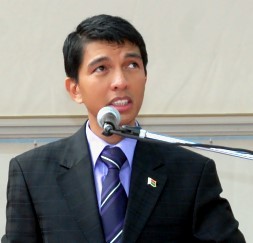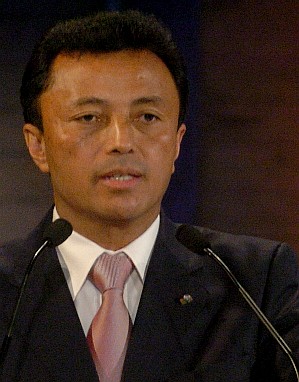|
Madagascar Economy - Development | Politics Madagascar sanctions deadline nears
Malagasy leader Rajoelina has participated in several international mediation processes that aimed at ending the Great Island's unconstitutional rule since his 2008 coup. African Union (AU) mediators have insisted on a power-sharing deal that would include the participation of former presidents Marc Ravalomanana and Didier Ratsiraka, leading towards democratic elections.
There has been a 60-70 percent fall in private sector production. Further, the trade gap over exports has almost quadrupled in two years to nearly US$ 2 billion – far more than the Malagasy economy can sustain. Still, Economy Minister Fienena is optimistic about 2010, saying "the worst of the crisis is over." He forecasts a 2.6 percent growth for this year - still below population growth and far less than the 7.5 percent predicted by the World Bank before the coup. Mr Fienena holds that Madagascar's private sector, now liberated from "monopoly on economic activity" of ex-President Ravalomanana, would drive the country's economy into new growth. Most analysts however forecast growth to be between 0 and 1 percent this year. Even negative growth cannot be excluded. Investors, the opposition and a growing number of Malagasy therefore pin their hopes to a political compromise that could finally stop sanctions and release donor aid funds. Recovery could be fast if AU mediators are convinced there is real progress towards constitutional rule. Donors are keen to return. Even AGOA could quickly be restored. The US act says countries must at least be making "continual progress" toward establishing the rule of law and political pluralism, the protection of human rights and workers rights and efforts to fight corruption to be eligible. It was the failure to make "continual progress" that caused President Barack Obama to suspend Madagascar in December. Ex-President Ravalomanana, in a statement sent afrol News, today urges the de-facto authorities of Madagascar "to get the agreed democratic process back on track and in so doing achieve a comprehensive solution to the crisis in our country." Mr Rajoelina should "avoid further sanctions on our people and give them the chance to decide who should lead them," the deposed leader added. But there are no signs of Mr Rajoelina being willing to give into AU demands by tomorrow. AU sanctions therefore seem unavoidable, soon to followed up by economic sanctions from Madagascar's main trade partners in Europe and the US. By staff writers © afrol News - Create an e-mail alert for Madagascar news - Create an e-mail alert for Economy - Development news - Create an e-mail alert for Politics news
On the Afrol News front page now
|
front page
| news
| countries
| archive
| currencies
| news alerts login
| about afrol News
| contact
| advertise
| español
©
afrol News.
Reproducing or buying afrol News' articles.
You can contact us at mail@afrol.com









